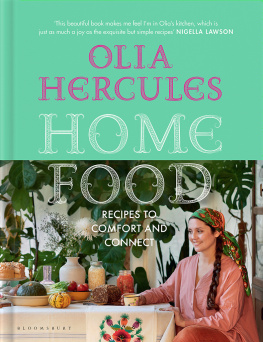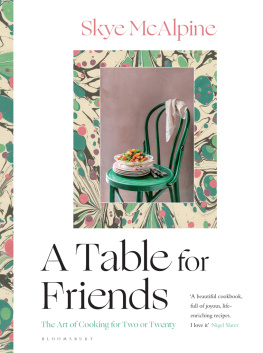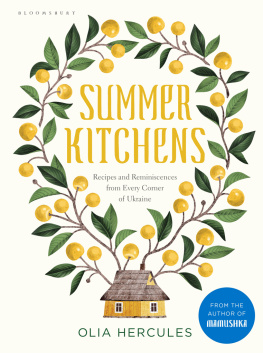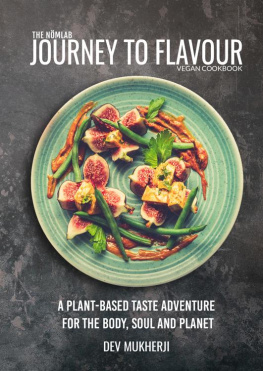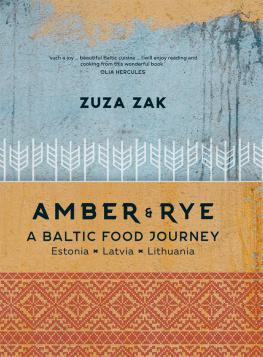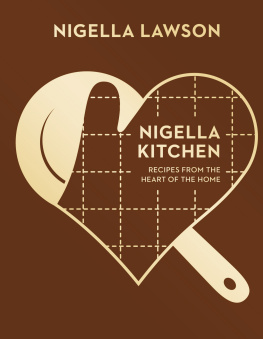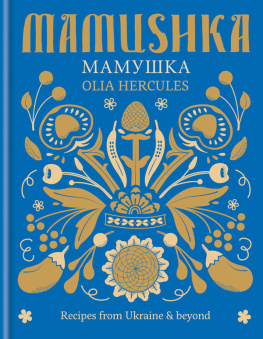
kaukasis
a culinary journey through
Georgia, Azerbaijan & beyond
OLIA HERCULES
MITCHELL BEAZLEY
Contents
How to use this ebook
Select one of the chapters from the and you will be taken to a list of all the recipes covered in that chapter.
Alternatively, jump to the to browse recipes by ingredient.
Look out for linked text (which is in blue) throughout the ebook that you can select to help you navigate between related recipes.

Introduction
Finding the name for this book was one of the hardest things I have ever had to do. How does one unite the idea of a childhood journey, memories and feelings of nostalgia with new-found knowledge of the Caucasus and its people? These folk may share the same geographical region, culture and much of their cooking, but they dont necessarily revere each other, or at least they often say they dont for various complicated reasons.
In the light of recent and not-so-recent events, where more and more neighbouring countries have gone to war and lost connections that have been cemented for centuries or have foolishly erected further barriers between them, I slipped into even more of a pitfall trying to navigate my way around and write sensitively about my family and friends life-long experiences.
In times of great economic struggle, people fall apart. I have seen it happen on a personal level, where close friends, parents and their children or siblings break ties with each other because it is simply very hard. When its hard to survive financially, hard to stay strong together and hard to make sense of history and events, its easy to forget what unites us.
On a greater scale, the same happens with entire countries, which fall out and drag us even further along the road of alienation and conflict, inciting hatred, misunderstandings and worse. This happened to my Armenian family who are originally from Nagorno-Karabakh and have inspired me to write this book.
A war broke out in Karabakh in the 1980s, forcing them first to abandon their summer house and then to leave that region and eventually Azerbaijans capital Baku to relocate to Kiev, the capital of Ukraine. Their house was largely destroyed, with only their huge beloved library room still standing with hundreds of books left abandoned and rotting on the shelves. Yet despite the anguish, mutual hostility and atrocities, I have not once heard my Armenian aunt say anything negative about Azerbaijanis. She has always reiterated that it was an artificially created conflict, like so many of them were at the time and still are.
I was taught from the start (perhaps in rather naive terms, but) that people and human values are universal. Whether you are Armenian, Azerbaijani or Georgian or one of any of the other Caucasian peoples, so much of the culture of the region is intertwined and destinies interwoven, and on a more domestic level so many cooking techniques and dishes are shared and borrowed. Geopolitics can often be an ugly, unfortunate reality, just like unemployment, financial difficulties and any of those other man-made afflictions. But I am glad that I grew up without having to take any sides. We cherished our Armenian, Azeri, Georgian, Ossetian, Karachai and Adegei friends all the same, equally interested in what they had to say, what they remembered, what they held dear and, of course, what they cooked!
Words kept running through my head: Caucasus, togetherness, communion, as one, family, table, polyphony, layers, together. One word, I needed just one word to unite us all, but not in a tragic, forceful way like the word Soviet once did. I needed one word to unite our complicated histories, our families memories, our new experiences in the most peaceful and natural way.
I tried a couple of options that I felt very strongly about, both powerful Georgian words, but sadly they didnt gel. In desperation, and following my best friends wise counsel, I wrote a couple of pages of why I decided to write this book a messy stream of consciousness kind of essay. And when I finished, I realized that I was overcomplicating things. The name doesnt have to be too clever, enigmatic or esoteric. The place itself, Caucasus, is mysterious enough.
Being an avid fan of etymology, I recalled reading that the name Caucasus possibly originated from the Scythian language (the Scythians being an ancient civilization from the Ukrainian steppe where I was born) and is akin to the gorgeous Greek word Kaukasis. It means snowy mountain top, and at that moment the title of the book was born! At the very top of the Kazbegi mountains in northeastern Georgia, I saw a viewing platform with a massive mosaic. It was beautiful. What I loved the most was that the animals and people depicted have clearly defined outlines, but within their forms are made up of mismatched coloured tiles. This is how I feel about culture, and about traditions and recipes. The outlines are there, set in stone, but whats happening inside is a big puzzle of individual fragments, multicoloured and seemingly mismatched.
I hope you also approach this book as such. Get inspired by the outlines, but also feel compelled to create your own mosaic. This is my interpretation, a symbol, a vision of how to cherish tradition while also being open to creating something new.


roots, shoots, leaves & all

I like vegetables, especially in spring, declared our Georgian guide Shota. Such a simple thing to say, but it rang so true and got stuck in my head. It had so much meaning. In our modern world we can get tomatoes, cucumbers and herbs all year round. Of course, nowadays you can too in the Caucasus, but people still tend to eat seasonally. The first fresh vegetables of spring, the first herbs, the first sweet prickly cucumber these ingredients are never better to enjoy than immediately after the long winter months.
Beetroot & plums
The combination of beets and plums was such a revelation to me that I immediately set about creating different versions of the authentic Georgian way of marinating beetroot in the tart plum sauce called tkemali. I couldnt choose which was the best, so I am giving two versions of the salad: the traditional approach and a roasted version for when plums are readily available but you cant be bothered to make the sauce. The roasted version will give you a taste similar to the original with the added pleasure of biting into caramelized plums and bitter leaves that contribute texture and a welcome savouriness. I use small tart Alycha plums here, but slightly underripe greengages or ordinary plums also work very well.
The original charkhali or plum-marinated beetroot
This is a method for making beetroot charkhali the authentic way, which is simple and delicious. But if you are short of time, you dont have to marinate it overnight you can serve with the tkemali immediately. Its brilliant, though, because if you have any left over, you can store it in the refrigerator and it will start to pickle. It should keep for up to a week if fully covered by the sauce. Serve with a slick of date molasses or honey if it seems too tart.
Next page

